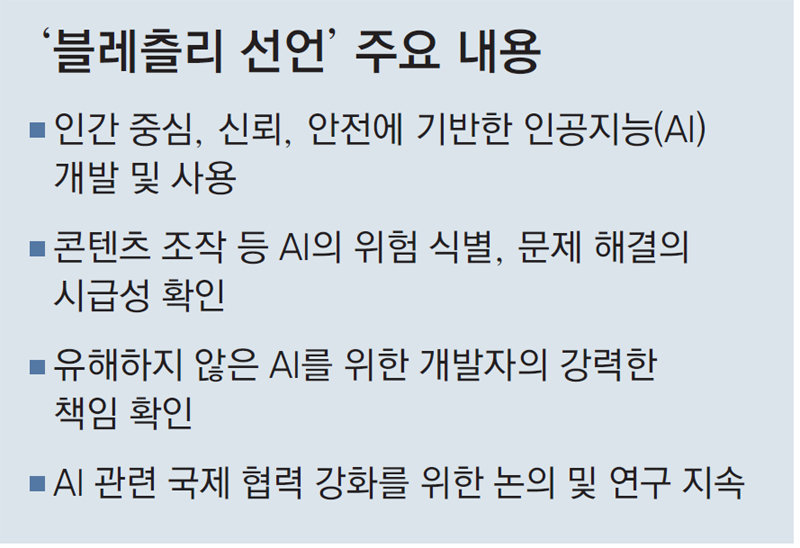[AI 안전 정상회의]
First ‘AI Safety Summit’ in the UK
Adoption of ‘Bletchley Declaration’ for global cooperation on content manipulation and cyber security
Competition for leadership in AI regulation is fierce… Disagreements on scope and strength of regulations in major countries
At the ‘Artificial Intelligence (AI) Safety Summit’ held in the UK for two days starting on the 1st (local time), 28 countries, including the US, UK, and China, and the European Union (EU) said, “Let’s cooperate to prevent the catastrophic risk of AI,” for the first time in the world. A joint declaration was issued. Even China, which is engaged in fierce technological competition with the United States, participated, attracting attention.
However, behind the declaration of cooperation, there was a fierce battle between countries to lead AI industry regulation. A fight over the leadership in establishing regulatory agencies has begun, centered around the United States and the United Kingdom, and differences of opinion have become visible among major countries over the scope and strength of AI regulation. There is an analysis that major countries are trying to solidify their AI hegemony by leading regulations in a direction favorable to their own AI companies and building entry barriers to other countries’ AI industries.
At the AI Safety Summit held at Bletchley Park, Birminghamshire, England on the 1st, 28 countries and the EU announced the ‘Bletchley Declaration’, the first international agreement on AI safety. This declaration contains a resolution for the international community to work together to resolve the issue, saying that AI can cause serious damage through misuse or content manipulation in fields such as cybersecurity and biotechnology.

To this end, AI developers were asked to take an active role in increasing the safety and transparency of the system. At the summit, Tesla CEO Elon Musk, who founded the AI venture company ‘xAI’ in June this year, Demis Hassabis, CEO of Google DeepMind, who developed ‘AlphaGo’, and Sam All, known as the ‘father of ChatGPT’ A large number of heads of global information technology (IT) companies, including OpenAI CEO Tman and Microsoft (MS) Vice Chairman and President Brad Smith, also attended.
The reason why major countries held a summit with AI as a single agenda for the first time and made a joint declaration is because generative AI, such as Chat GPT, has recently developed rapidly and can pose a threat to national security as well as daily economic and social activities. .
Although the participating countries emphasized cooperation, a battle of wits is emerging behind the scenes. The UK, the host country, chose Bletchley Park, the birthplace of modern computing, where the German military code ‘Enigma’ was deciphered during World War II. This is where the Allied forces, to which Britain belongs, played a decisive role in intercepting the German army’s tactics and turning the tide of the war. Moreover, Britain sent an invitation to China despite tacit opposition from the United States.
The United States and the United Kingdom also competed over the establishment of an ‘AI Safety Research Institute’ to regulate AI. On the same day that British Prime Minister Rishi Sunnack announced his intention to establish an AI safety research center along with holding a summit on the 1st, U.S. Secretary of Commerce Gina Lamondo also emphasized the plan to establish the same research institute and its excellence. U.S. Vice President Kamala Harris also attempted to express her intention to take the lead in AI by calling for urgent measures to protect democracy from the risks of AI in a speech delivered at the U.S. Embassy in London on the same day. Politico, a U.S. political media outlet, commented, “Vice President Harris showed Prime Minister Sunnack who is the ‘boss.’”
Major countries are showing differences in views on the scope and strength of AI regulations. At this summit, Prime Minister Sunnack focused on the extreme risks of AI, such as the development of biological and chemical weapons, but Vice President Harris emphasized the need for broader regulation, saying that AI models already in operation pose an ‘existential threat’. did. On the other hand, China, which announced a strong AI regulation plan in July of this year, established an international regulatory agency and called for strict regulations, such as mandating the registration of advanced AI systems and immediately shutting down any problems.
Regarding this, there is an analysis that major countries are trying to solidify their hegemony in future industries by leading AI regulations in a direction favorable to their own industries. Lee Seong-yeop, a professor at Korea University’s Graduate School of Technology Management, said, “It is difficult for companies to ask for regulations on their own, but seeing that even companies with high technology levels are participating and mentioning regulations, it seems that they are trying to build an ‘entry barrier’ through regulations.”
Paris =
Source: Donga
Mark Jones is a world traveler and journalist for News Rebeat. With a curious mind and a love of adventure, Mark brings a unique perspective to the latest global events and provides in-depth and thought-provoking coverage of the world at large.